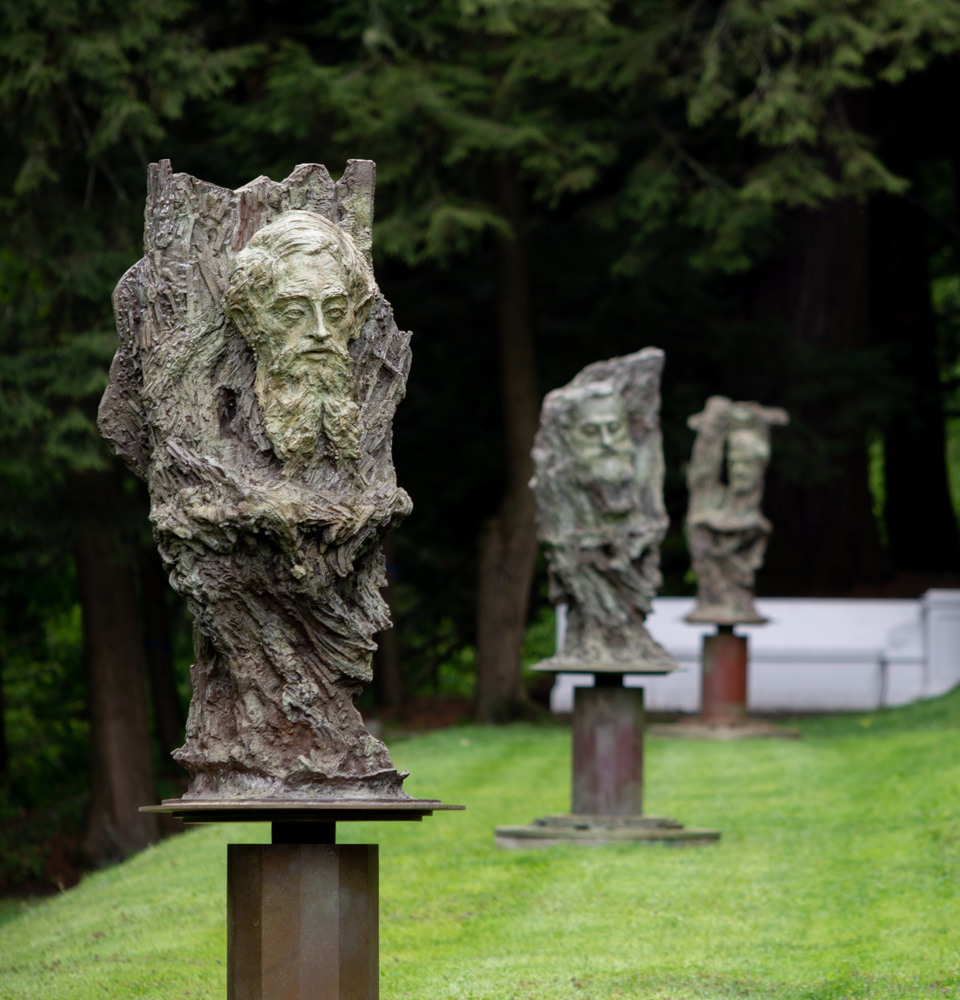News Release
You are viewing ARCHIVED content published online before January 20, 2025.
Please note that this content is NOT UPDATED, and links may not work. For current information,
visit https://www.nps.gov/aboutus/news/index.htm.

NPS Photo/Moses Chun
|
Subscribe
|
The exhibition, titled “Hudson on the Garden,” includes Wyatt’s renderings of Thomas Moran, Albert Bierstadt, and Sanford Gifford – three 19th century artists who painted landscapes that sparked the idea that beauty could justify preservation. Wyatt’s 21st century sculptures, situated harmoniously in a garden landscape, invite visitors to consider the continued power of art to shape human relationships with the natural world. Marsh-Billings-Rockefeller is home to the National Park Service’s premier collection of Hudson River School art. These paintings, many of which were acquired by the Billings and Rockefeller families, now hang on the walls of the park’s historic mansion.
A team from the Modern Art Foundry will clean and wax the sculptures at the national park starting Wednesday, September 4. Visitors are invited to stroll through the gardens to observe this process in action. On Saturday September 7, shortly after 1pm, the Foundry team, with Wyatt narrating, will demonstrate the art of applying the final patina to the portrait of Sanford Gifford. This pyrotechnic display offers a rare glimpse into the final steps of the complex bronze sculpture process and the relationships between artist and artisan.
Raised in the Hudson River valley of New York, much of Greg Wyatt’s earliest artistic inspiration came from his father, Professor William Stanley Wyatt, a painter and fine arts professor at Columbia University and the City College of the City University of New York. Greg Wyatt’s work, which merges highly realistic representational figures with creative masses of form, space and energy, is imbued with lyricism and spirituality. His sculptures have been exhibited at major intuitions and in public spaces across the world. He is currently the sculptor-in-residence at the Cathedral Church of St. John the Divine in New York City.
“Greg’s bronze portraits honor three of the most important artists to the American conservation movement,” says park Curator Ryan Polk. He adds, “I think the artists themselves would appreciate having their portraits in a beautiful garden. Greg wanted these landscape artists to be part of the landscape. Their green patina showcases the natural colorization of bronze and blends seemlessly with the Vermont Green Mountain landscape. Through these homage portraits, he shows that art continues to inspire conservation - the work continues.”
“We are excited that Mr. Wyatt was able to open his exhibition during the weekend of Woodstock’s annual art festival,” says Chief of Interpretation and Education, Stephanie Kyriazis. “We know lots of folks with an interest in and passion for art will be in town, and invite them to come to the park to experience the patina demonstration, and reflect on the intersections between art, natural beauty, and a stewardship ethic.”
“Hudson on the Garden” is part of an ongoing series of exhibitions at Marsh-Billings-Rockefeller NHP that explore the role of art in the American conservation movement. Also on view now at the Carriage Barn Visitor Center is an exhibit, “Creating an American Landscape” of prints from photographer Carleton Watkins’ mid-1800s Yosemite portfolio. These images were instrumental in advancing the legislation, signed by President Lincoln in 1864, that protected Yosemite Valley from development and paved the way for its designation as a national park several decades later.
Visitors wishing to observe the cleaning and waxing of Wyatt’s sculptures, attend the “Hudson on the Garden” exhibition opening ceremony and patina demonstration, or view the Watkins photography should park in the Billings Farm & Museum lot and walk up to the national park. All art exhibitions and demonstrations are free and open to the public. There is a small fee ($8 for adults, $4 for seniors 62+, free for children 15 and under) for visitors wishing to attend a mansion tour, offered daily through October 31, in order view the park’s collection of Hudson River School paintings. For reservations, or information about accessible parking, please call 802-457-3368 x222. For additional information, see www.nps.gov/mabi.
Last updated: August 26, 2019
